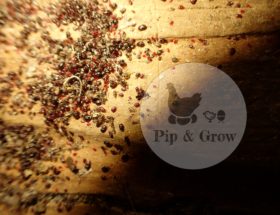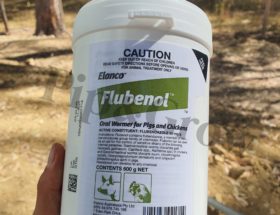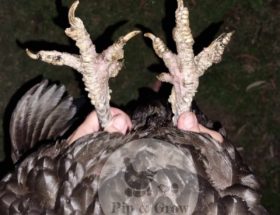It’s common for chickens to be exposed to internal parasites at some point in their lives, particularly if they have access to outdoor areas where they can come into contact with soil, contaminated food, or water sources. Additionally, certain species of worms can be transmitted through intermediate hosts like insects or other animals.
While many chickens and chicks may have worms, not all infestations will immediately affect the chicken’s health. Some chickens may appear happy and healthy despite having worms. However, if the worm burden inside the chicken’s intestine becomes excessive, it can lead to health problems. Therefore, it’s recommended to regularly worm chickens using appropriate products to maintain their optimal health and prevent potential complications from worm infestations.
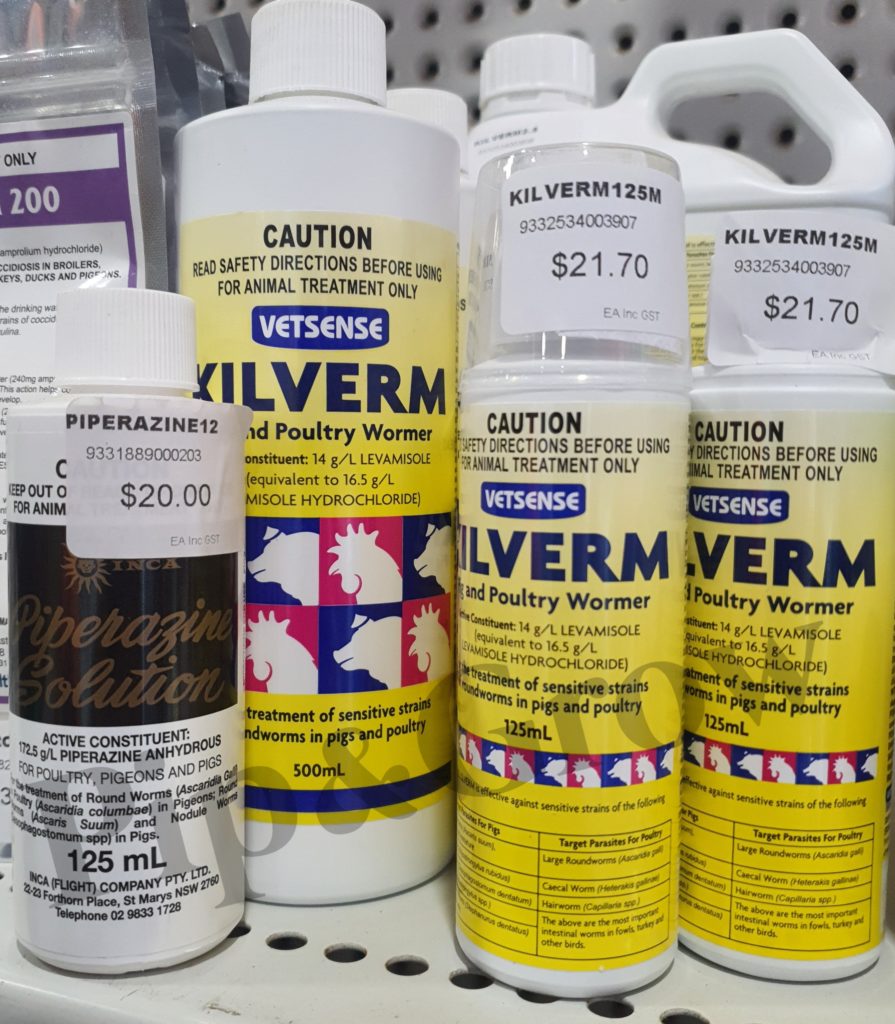
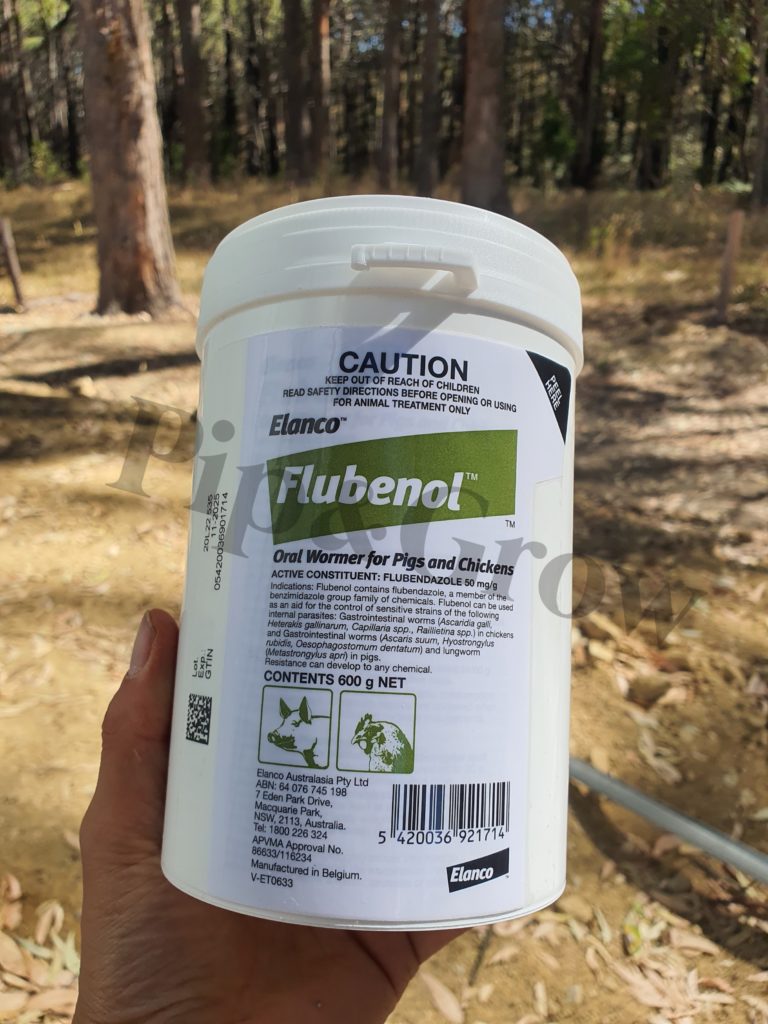
Q. Do we need to worm chickens?
A. Worming chickens is recommended for maintaining their health and preventing the negative effects of internal parasites. Worm infestations can lead to weight loss, decreased egg production, and overall poor health in chickens if left untreated.
Q. How often should I worm my chickens?
A. The frequency of worming is determined by factors like the prevalence of worms, the chickens’ age, and their living conditions. Typically, chickens should undergo regular worming, with intervals varying from a few months to twice a year.
Chicks can be wormed between 6-8 weeks, depending on the product and necessity. At Pip & Grow, we administer worming treatment to our birds every 3 months using Flubenol.
Q. What are the signs that my chickens need worming?
A. Signs of worm infestation in chickens include diarrhea, messy feathers around the vent, weight loss, decreased egg production, pale comb and wattles, lethargy, and visible worms or worm segments in droppings.
Q. What types of worms affect chickens?
A. There are various types of worms that can affect chickens, with the most common ones listed below. Identifying the specific type of worm infestation is crucial to administer the appropriate treatment effectively, as each product targets certain types of worms.
-Roundworms (Nematodes): These are the most common type of internal parasites found in chickens. They can cause damage to the digestive tract and other organs if left untreated.
-Tapeworms (Cestodes): Tapeworms are flat, segmented parasites that can attach to the lining of the chicken’s intestines. They can cause weight loss, poor growth, and decreased egg production.
-Gapeworms (Syngamus trachea): These worms infect the respiratory tract of chickens, particularly the trachea (windpipe). Infestations can lead to respiratory distress, gasping for air, and even death if left untreated. While less common in Australia according to Dr Grant Richards, Allfarm Animal Health, they still pose a threat.
-Capillary Worms (Hairworms): These tiny, thread-like worms live in the intestinal lining and can cause anemia and weight loss in chickens.
-Threadworms (Strongyloides): Threadworms are small, hair-like parasites that can infect the digestive tract and cause diarrhea and weight loss.
Q. How do I worm my chickens?
A. There are different methods for worming chickens, including medicated feed (Vella Stockfeeds Wormer MP), water additives (Kilverm, Piperazine), feed additives (Flubenol) and oral or topical medications(Avitol). Most are available at farm supply stores, fodder shops, and online retailers.
Please adhere to the instructions provided by the manufacturer regarding the types of worms each product treats. Some products may require withholding food or water for 12-24 hours prior to worming to ensure effectiveness. To do this, it’s advisable to remove feed or water around lunchtime, withhold food or water as directed on the product label, and administer the treatment accordingly on the following day. Rest assured, withholding food or water for the specified time will make them hungry and thirsty, but not adversely affect the health of the chickens.
Avitrol Plus bird wormer tablets are also a popular choice among poultry keepers as an “off-label” product due to their effectiveness and convenience. However, it’s important to note that there is no proper evidence or official testing conducted for this product regarding the withholding period for eggs or meat. Keepers must use caution and consult with a veterinarian or poultry health expert before using such products.
Q. Can I use natural remedies to worm my chickens?
A. Some chicken keepers choose to utilize natural remedies like garlic, pumpkin seeds, chili flakes, or diatomaceous earth to potentially prevent worm infestations in their flock. While these methods may offer some benefits, it’s important to note that there is limited scientific evidence or conclusive proof of their efficacy. Consequently, they may not always be as reliable as conventional medications and may not provide comprehensive protection against all types of worms. Therefore, while natural remedies can be part of a holistic approach to chicken health, they should be used alongside, not as a substitute for, proven de-worming protocols.
Q. Can I prevent worm infestations in my chickens?
A. While it’s challenging to completely prevent chickens from getting worms, proactive measures can significantly reduce the risk of infestations. Maintaining cleanliness in the coop, providing clean water and feed, rotating pasture, keep pens and runs dry and monitoring chicken health are crucial steps. Additionally, implementing a de-worming schedule can help control worm populations. While some exposure to worms may be inevitable, proactive management practices can minimize their impact on chicken health and well-being.
Related Post
How we use Flubenol Wormer at Pip & Grow
